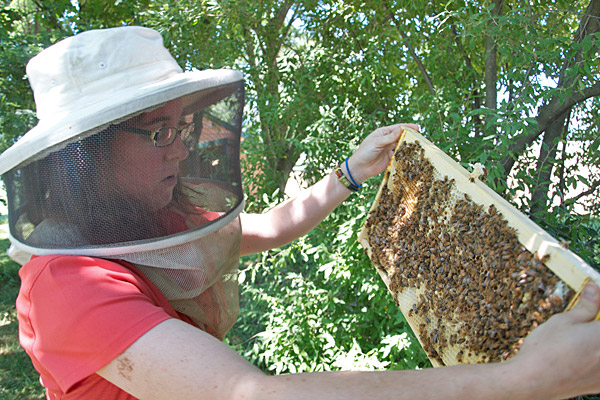
Ag Day buzz
Ag Day visitors can do the 'waggle dance' at beehive exhibit
8:38 a.m., April 24, 2012--There’s something for almost everyone at Ag Day, this Saturday, April 28, at the University of Delaware. There’ll be pony rides, farm tours, the UD Botanic Gardens plant sale, sheep-shearing demos and free-flight bird shows. And, at one of the most popular attractions, a chance to see an open beehive and learn how to do the “waggle dance.”
Debbie Delaney, a UD assistant professor of entomology and wildlife ecology, is responsible for the Ag Day bee exhibit, which is staffed by her graduate and undergraduate students.
Campus Stories
From graduates, faculty
Doctoral hooding
“Visitors do seem to like the bee exhibit,” acknowledges Delaney. “In recent years, I think people have become more aware of the critical role that bees play in pollinating crops – here in North America they’re responsible for pollinating some 90 crops.”
Beyond that, notes Delaney, “bees are fascinating social insects. People want to learn more about them. Take the ‘waggle dance,’ performed by honeybees. With this figure-eight dance, honeybees are able to tell their hive mates where to find patches of flowers, water, new housing locations and more. The direction of the dance demonstrates the angle other bees should fly to find the nectar source. And the speed of the movements indicates the value of the source.”
At Ag Day, waggle dances and open beehive demonstrations (by veiled beekeepers in a cage) get the most attention. But visitors who check out the rest of the exhibit will discover that UD’s bee program is abuzz with activity.
“It’s an exciting time to be a bee researcher at UD,” says Delaney. “We have lots of going on, from the addition of a second apiary to several innovative research projects.”
Delaney is starting the second year of a research study to see if bumblebees improve crop productivity. Before this project, bumblebee research hadn’t been conducted in Delaware since the 1940s. But Delaney and her co-researcher, Gordon Johnson, a Cooperative Extension fruit and vegetable specialist, see potential in bumblebees.
“Over the past decade, managed honeybee populations have been in decline due to colony collapse disorder and other factors,” says Delaney. “In response, growers and researchers have started to pay a lot of attention to native pollinators, and in particular, to bumblebees.”
Delaney also is excited that the University will soon be home to two apiaries -- the existing 22-hive teaching apiary and a new research apiary operated in collaboration with Penn State University and supported by the Environmental Protection Agency. Delaney and other researchers will use this apiary to study non-chemical ways to manage parasites in colonies.
The teaching apiary, tucked below mature black locust and tulip poplar trees, is the hands-on classroom for Delaney’s beekeeping class. Her students steward their own hives and learn bee biology and beekeeping skills. Plus, the honey that these students collect can now be purchased. “Dare to Bee Honey” is sold exclusively at the UDairy Creamery. The first batch of the 2012 season should be available for sale in late July or August.
Grad student Katherine Darger doesn’t utilize either UD colony for her bee research. Working closely with Delaney, Darger is testing for Africanization tendencies in unmanaged colonies from Florida to Maine. However, since Darger says she is “happiest when knee-deep in a colony,” she tries to get out to the UD hives as much as she can.
She will be showing off her hive-handling skills at Ag Day, performing several of the caged demonstrations, which take place at 10 a.m., 1 p.m. and 3 p.m.
Darger likes Ag Day and other public events almost as much as she likes being in the apiary. “I love doing outreach,” she says. “I hope to inspire more people to become beekeepers, plant gardens to attract and support native insects, and reduce the fear that draws people to insecticide cans.”
Article by Margo McDonough
Photo by Danielle Quigley








